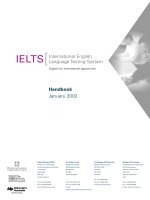Sentence correction 4 english grammar
Bạn đang xem bản rút gọn của tài liệu. Xem và tải ngay bản đầy đủ của tài liệu tại đây (8.2 KB, 1 trang )
Sentence correction
Incorrect: Neither Peter nor John were present.
Correct: Neither Peter nor John was present.
Two singular nouns connected by or or nor should be followed by a singular verb.
Incorrect: Neither the lecturers nor the principal were present at the meeting.
Correct: Neither the principal nor the lecturers were present at the meeting.
When two subjects connected by or or nor are of different numbers, the plural subject should be written last and it
should be followed by a plural verb.
Incorrect: Neither I nor he has money to buy that watch.
Correct: Neither he nor I have money to buy that watch.
Incorrect: Neither James nor you seem to be capable of doing that.
Correct: Neither you nor James seems to be capable of doing that.
When the subjects connected by or or nor are of different persons, the verb should agree in person with the
subject nearest to it. The subjects should be arranged in the proper order – the person spoken to, first; the person
spoken of, second; and the speaker, last).
Incorrect: A committee were appointed to study the question.
Correct: A committee was appointed to study the question.
Incorrect: The jury was divided in its opinion.
Correct: The jury were divided in their opinion.
Group nouns (e.g. committee, jury, army, team, family etc.) are followed by singular verbs when the group is
thought of as a single unit. But when individual members of the group are thought of, the plural verb is used.
Stay on top of your writing! Download our grammar guide from www.englishgrammar.org to stay up-to-date.
Powered by TCPDF (www.tcpdf.org)









